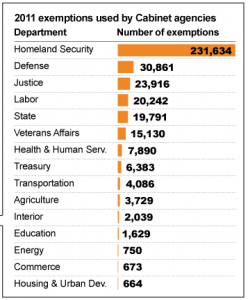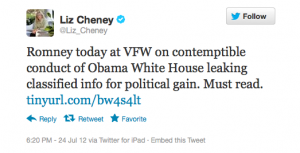Navy v. Egan, not Just Branzburg v. Hayes, Needs Fixed
Today, 340 new journalists will join the 10 or so who have been covering the Bradley Manning prosecution closely for the last several years; his trial starts today at Fort Meade.
Expect to see a bunch of essays on secrecy to mark the beginning of the trial.
This one, in which Steven Coll calls for the Supreme Court to revisit the Branzburg v. Hayes decision that established a spirit but not a law protecting press sources, has already generated a lot of attention.
In the long run, to rebalance the national-security state and to otherwise revitalize American democracy, the United States requires a Supreme Court willing to deepen protections for investigative reporters, as the majority in Branzburg would not.
Among some other minor factual inaccuracies (including what the AP UndieBomb 2.0 leak was originally about), it includes this claim.
[Obama’s] longest-serving advisers are disciplined and insular to a fault; press leaks offend their aesthetic of power.
While I agree Obama’s advisors are insular to a fault, and agree they revel in an aesthetic of power, they do not despise all press leaks. Even aside from the typical policy debate leaks of classified information, the White House has long reveled in “leaking” classified information to selected members of the press, to get the information out there on its own terms. The tactic is not new — it is precisely the A1 cut-out approach the Bush Administration used to get us into the Iraq War. But the Obama Administration may have expanded its use (that is actually the reason Republicans in Congress were demanding investigations of the leaks that followed the AP story, the ones that, unlike the AP, exposed our mole).
Which is why Coll proposes an inadequate solution to what I agree is the key problem.
Obama inherited a bloated national-security state. It contains far too many official secrets and far too many secret-keepers—more than a million people now hold top-secret clearances. Under a thirty-year-old executive order issued by the White House, the intelligence agencies must inform the Justice Department whenever they believe that classified information has been disclosed illegally to the press. These referrals operate on a kind of automatic pilot, and the system is unbalanced. Prosecutors in Justice’s national-security division initially decide on whether to make a criminal case or to defer to the First Amendment. The record shows that in recent years the division has been bent on action.
I’m not opposed to establishing clearer laws about when a journalist’s sources may be protected. But that can be used — as Dick Cheney tried to use it — as a screen for his exposure of Valerie Plame. Protecting journalists’ sources will not only protect real whistleblowers, but it will also protect the system of official leaks that both Bush and Obama have used to accrue power and avoid accountability.
So not only is fixing Branzburg v. Hayes not enough to fix our “unbalanced … bloated national security state,” it doesn’t get at the underlying problem
As a threshold measure, journalists should be calling for the limitation or repeal of the Espionage Act, which is the real stick Obama is using to cut down on unsanctioned leaks. It’s bad enough for whistleblowers to risk losing their clearance, and with it, a well-compensated livelihood. But as soon as you start talking extended prison sentences, as soon as you start accusing whistleblowers of being worse than an enemy’s spy because they shared damning information with the public generally, that’s going to silence unsanctioned leaks.
Just as importantly, this entire structure of abuse of power rests on a different SCOTUS decision, Navy v. Egan, which gives the Executive absolute control over security clearances (and therefore the less powerful leverage usually wielded against whistleblowers, the ability to strip their clearance), but which has been interpreted by Bush and Obama to give the Executive unfettered authority to determine what is secret and what is not. This decision — which is precisely what David Addington told Scooter Libby he could rely on to justify outing Plame on Cheney’s order — is also what the Obama Administration cited when it refused to litigate al-Haramain and in so doing granted the Bush Administration impunity for illegal wiretapping. The Executive’s claim to have unlimited authority to decide what is secret and not is also what prevents the Senate Intelligence Committee from declassifying the torture report on its own authority. It is also the basis for the authority to stall releasing video of US helicopters gunning down a Reuters team to Reuters under FOIA, which led to Manning leaking it to WikiLeaks himself.
The Obama and Bush Administrations have claimed that no one — not Congress, not the Courts — has the authority to review their arbitrary use of secrecy to accrue more power. That claim is an expansive reading of Navy v. Egan, but thus far not one anyone has challenged before SCOTUS. And that is what has enabled them (with the limited exception of the Plame outing) to avoid all consequences for their asymmetric use of leaks.
So, yes, it would be useful if SCOTUS decided that journalists and others engaging in legitimate investigation can protect sources, especially when investigating national security. But until the underlying system — the Executive’s claim that it can abuse secrecy to protect itself — is changed, secrecy will remain a cancer rotting our democracy.


